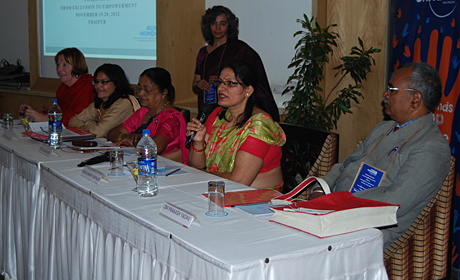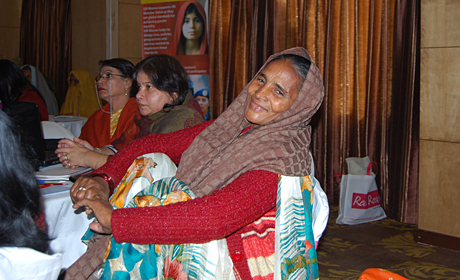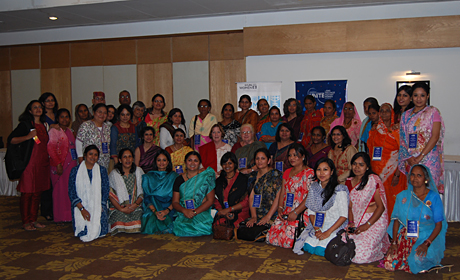Widows still face high levels of harassment, says a study by UN Women
Date:
A baseline study of UN Women’s widows programme finds that 25% of widow participants from Nepal, Sri Lanka and India faced harassment in the last six months.
Udaipur (India) - At a two-day meeting organized to share knowledge on widows and their experiences, some women cried, others sat and sympathetically listened, but everyone drew comfort from coming together. Hope was in the air.

As Shivalingum, a 50-year-old widow from Sri Lanka said: “I would like to tell single women that they need to have self-confidence and they should be able to act for themselves, and not be side lined by anyone.”
She was speaking in the presence of 50 widows, civil society representatives, leading academics, and government representatives from Nepal, Sri Lanka and India. Sharing critical knowledge on widows and their needs, UN Women presented a study that made it clear that public programmes for widows should take into account the diversity in the age of the widows as well as their low education levels.
The baseline study found that the widows still faced high levels of harassment. “If they are able to earn an income and access their inheritance, they will be more secure. The study found that some widows require significant assistance in accessing any relevant pensions and in fact many widows were unaware of available assistance,” said Mini Thakur, lead researcher for the baseline study. 492 widows from Nepal, Sri Lanka and India were interviewed as part of this baseline study. A secondary research study identifying gaps in the existing policies and programmes in the three countries was also presented at the meeting.
From exclusion to empowerment
Funded jointly by UN Women and the Swiss National Committee, the programme is currently being implemented in 10 locations in India, Nepal and Sri Lanka. The baseline study is part of an innovative three-year UN Women programme that aims to works with widows, civil society organizations, research experts and governments in the three countries to reduce their social exclusion, help them to access public services and become active leaders. The aim is to evolve replicable strategies to empower widows. For example, the programme has supported 52 widows with access to their pensions – a lifeline for their survival.
Partners include local organisations that have worked extensively with widows such as Ekal Nari Shakti Sangathan and Guild for Service of Vrindavan in India, Women’s Human Rights in Nepal and Women’s Education and Research Centre in Sri Lanka.
Sharing experiences
“The conference was an opportunity for participants to share their common experiences of widowhood and to identify areas of struggle for widows. For instance, there was agreement that widows can be particularly vulnerable to poverty following the passing of a husband. Therefore, it is critical for widows to organize and form networks to strengthen their voices, ” said Anju Pandey, Programme Specialist, UN Women.

In some cases, women shared stories of financial exploitation when extended family members tried to acquire property that rightly should have passed to her . Many widows said that the social stigmatization and isolation attached to the status of widowhood was a particular barrier to be overcome. “In the development sector, widows as a group are increasingly becoming an area of focus. Civil society is beginning to learn about the experiences of widows and how they can be vulnerable particularly to social stigmatization and isolation,” said Anne F. Stenhammer, UN Women Regional Programme Director, UN Women South Asia.
Why the world needs to look at widows
In South Asia particular focus is also being directed to the existence of ‘conflict widows’, women who have been widowed as a result of their husbands dying from conflict such as civil war. Conflict widows are often very young and do not have established financial security to rely upon. Likewise, there are other young widows in South Asia as a result of child marriage.

Through these efforts, UN Women is hoping to bring attention to the experiences of widows throughout South Asia and working to ensure society and government is sensitive and responsive to the needs of widows.